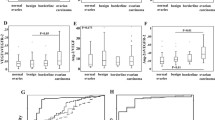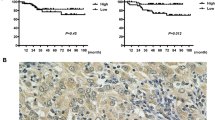Abstract
Preoperative evaluation of the risk for metastases in endometrial carcinoma is challenging. The growth of new vessels, angiogenesis, is important for tumor growth and purported to be involved in the metastatic process. The aim of this study was to evaluate the significance of preoperative serum levels and immunohistochemical expression of angiogenic markers in predicting a metastasized disease. Preoperative sera from 98 consecutive women presenting with endometrial carcinoma were collected. Serum concentrations of VEGF, sFLT1, and CD105 were assessed by enzyme-linked immunosorbent assay (ELISA). Immunohistochemistry was used to assess the expression of CD105, VEGF, FLT1, and KDR. The results were correlated to the presence of metastases, presence of deep (≥50 %) myometrial invasion, and the histological grade of the tumor. Tumors with other than endometrioid histology were excluded. Of the 80 evaluable patients, 11 had a metastasized disease. The serum concentration of VEGF was higher in the group with metastases than in the group without metastases (median [range], 743 pg/mL [546–1,183 pg/mL] vs. 383 pg/mL [31–1,524 pg/mL], p < 0.001, respectively). In the multivariable analysis, the concentration of VEGF was the sole independent, albeit weak predictive factor for the presence of metastases (odds ratio, 1.004, 95 % confidence interval, 1.002–1.007; p = 0.001). The immunohistochemical expression of the markers was not associated with any of the clinicopathological features of the tumors. The results of the present study suggest that preoperative serum VEGF concentration correlates with the presence of metastases in endometrioid endometrial carcinoma.

Similar content being viewed by others
References
Sorosky JI. Endometrial cancer. Obstet Gynecol. 2008;111:436–47.
Creasman WT, Morrow CP, Bundy BN, et al. Surgical pathologic spread patterns of endometrial cancer. A gynecologic oncology group study. Cancer. 1987;60:2035–41.
Chan JK, Kapp DS, Cheung MK, et al. Prognostic factors and risk of extrauterine metastases in 3867 women with grade 1 endometrioid corpus cancer. Am J Obstet Gynecol. 2008; 198:216.e1–216.e5.
Chi DS, Barakat RR, Palayekar MJ, et al. The incidence of pelvic lymph node metastasis by FIGO staging for patients with adequately surgically staged endometrial adenocarcinoma of endometrioid histology. Int J Gynecol Cancer. 2008;18:269–73.
Ferrara N. Molecular and biological properties of vascular endothelial growth factor. J Mol Med. 1999;77:527–43.
Delli Carpini J, Karam AK, Montgomery L. Vascular endothelial growth factor and its relationship to the prognosis and treatment of breast, ovarian, and cervical cancer. Angiogenesis. 2010;13:43–58.
Wu FT, Stefanini MO, Mac Gabhann F, et al. A systems biology perspective on sVEGFR1: its biological function, pathogenic role and therapeutic use. J Cell Mol Med. 2010;14:528–52.
Olsson AK, Dimberg A, Kreuger J, et al. VEGF receptor signalling—in control of vascular function. Nat Rev Mol Cell Biol. 2006;7:359–71.
Cheifetz S, Bellon T, Cales C, et al. Endoglin is a component of the transforming growth factor-beta receptor system in human endothelial cells. J Biol Chem. 1992;267:19027–30.
Dallas NA, Samuel S, Xia L, et al. Endoglin (CD105): a marker of tumor vasculature and potential target for therapy. Clin Cancer Res. 2008;14:1931–7.
Mutch DG. The new FIGO staging system for cancers of the vulva, cervix, endometrium and sarcomas. Gynecol Oncol. 2009;115:325–8.
Yokoyama Y, Sato S, Futagami M, et al. Prognostic significance of vascular endothelial growth factor and its receptors in endometrial carcinoma. Gynecol Oncol. 2000;77:413–8.
Kamat AA, Merritt WM, Coffey D, et al. Clinical and biological significance of vascular endothelial growth factor in endometrial cancer. Clin Cancer Res. 2007;13:7487–95.
Giatromanolaki A, Sivridis E, Brekken R, et al. The angiogenic “vascular endothelial growth factor/flk-1(KDR) receptor” pathway in patients with endometrial carcinoma: prognostic and therapeutic implications. Cancer. 2001;92:2569–77.
Hirai M, Nakagawara A, Oosaki T, et al. Expression of vascular endothelial growth factors (VEGF-A/VEGF-1 and VEGF-C/VEGF-2) in postmenopausal uterine endometrial carcinoma. Gynecol Oncol. 2001;80:181–8.
Lee CN, Cheng WF, Chen CA, et al. Angiogenesis of endometrial carcinomas assessed by measurement of intratumoral blood flow, microvessel density, and vascular endothelial growth factor levels. Obstet Gynecol. 2000;96:615–21.
Ozbudak IH, Karaveli S, Simsek T, et al. Neoangiogenesis and expression of hypoxia-inducible factor 1alpha, vascular endothelial growth factor, and glucose transporter-1 in endometrioid type endometrium adenocarcinomas. Gynecol Oncol. 2008;108:603–8.
Yokoyama Y, Charnock-Jones DS, Licence D, et al. Expression of vascular endothelial growth factor (VEGF)-D and its receptor, VEGF receptor 3, as a prognostic factor in endometrial carcinoma. Clin Cancer Res. 2003;9:1361–9.
Fine BA, Valente PT, Feinstein GI, et al. VEGF, flt-1, and KDR/flk-1 as prognostic indicators in endometrial carcinoma. Gynecol Oncol. 2000;76:33–9.
Fujimoto J, Ichigo S, Hirose R, et al. Expressions of vascular endothelial growth factor (VEGF) and its mRNA in uterine endometrial cancers. Cancer Lett. 1998;134:15–22.
Talvensaari-Mattila A, Soini Y, Santala M. VEGF and its receptors (flt-1 and KDR/flk-1) as prognostic indicators in endometrial carcinoma. Tumour Biol. 2005;26:81–7.
Chen CA, Cheng WF, Lee CN, et al. Serum vascular endothelial growth factor in epithelial ovarian neoplasms: correlation with patient survival. Gynecol Oncol. 1999;74:235–40.
Schoenleber SJ, Kurtz DM, Talwalkar JA, et al. Prognostic role of vascular endothelial growth factor in hepatocellular carcinoma: systematic review and meta-analysis. Br J Cancer. 2009;100:1385–92.
Bozas G, Terpos E, Gika D, et al. Prechemotherapy serum levels of CD105, transforming growth factor beta2, and vascular endothelial growth factor are associated with prognosis in patients with advanced epithelial ovarian cancer treated with cytoreductive surgery and platinum-based chemotherapy. Int J Gynecol Cancer. 2010;20:248–54.
Gornall RJ, Anthony FW, Coombes EJ, et al. Investigation of women with endometrial carcinoma using serum vascular endothelial growth factor (VEGF) measurement. Int J Gynecol Cancer. 2001;11:164–6.
Bando H, Weich HA, Brokelmann M, et al. Association between intratumoral free and total VEGF, soluble VEGFR-1, VEGFR-2 and prognosis in breast cancer. Br J Cancer. 2005;92:553–61.
Chang YT, Chang MC, Wei SC, et al. Serum vascular endothelial growth factor/soluble vascular endothelial growth factor receptor 1 ratio is an independent prognostic marker in pancreatic cancer. Pancreas. 2008;37:145–50.
Aref S, El Sherbiny M, Goda T, et al. Soluble VEGF/sFLt1 ratio is an independent predictor of AML patient out come. Hematology. 2005;10:131–4.
Saad RS, Jasnosz KM, Tung MY, et al. Endoglin (CD105) expression in endometrial carcinoma. Int J Gynecol Pathol. 2003;22:248–53.
Salvesen HB, Gulluoglu MG, Stefansson I, et al. Significance of CD 105 expression for tumour angiogenesis and prognosis in endometrial carcinomas. APMIS. 2003;111:1011–8.
Erdem O, Taskiran C, Onan MA, et al. CD105 expression is an independent predictor of survival in patients with endometrial cancer. Gynecol Oncol. 2006;103:1007–11.
Zakrzewski PK, Cygankiewicz AI, Mokrosinski J, et al. Expression of endoglin in primary endometrial cancer. Oncology. 2011;81:243–50.
Takahashi N, Kawanishi-Tabata R, Haba A, et al. Association of serum endoglin with metastasis in patients with colorectal, breast, and other solid tumors, and suppressive effect of chemotherapy on the serum endoglin. Clin Cancer Res. 2001;7:524–32.
Fujita K, Ewing CM, Chan DY, et al. Endoglin (CD105) as a urinary and serum marker of prostate cancer. Int J Cancer. 2009;124:664–9.
Acknowledgments
The study was financially supported by Competitive Research Funding of Tampere University Hospital (grants 9L062 and 9N035). The English language was checked and revised by Ms. Piia Mäenpää, MA (English).
Conflicts of interest
None
Author information
Authors and Affiliations
Corresponding author
Rights and permissions
About this article
Cite this article
Saarelainen, S.K., Staff, S., Peltonen, N. et al. Endoglin, VEGF, and its receptors in predicting metastases in endometrial carcinoma. Tumor Biol. 35, 4651–4657 (2014). https://doi.org/10.1007/s13277-014-1609-6
Received:
Accepted:
Published:
Issue Date:
DOI: https://doi.org/10.1007/s13277-014-1609-6




